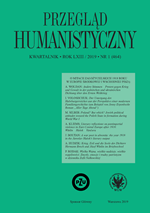Poland? But which? Jewish Political Attitudes toward the Polish State in Formation during World War I
Poland? But which? Jewish Political Attitudes toward the Polish State in Formation during World War I
Author(s): Marcos SilberSubject(s): History
Published by: Wydawnictwa Uniwersytetu Warszawskiego
Keywords: WWI; Jewish Nationalism; Minority Rights; German occupation of Poland during WWI; Agudas Isroel; Bund; Zionism; Folkism
Summary/Abstract: What kind of country are we talking about when we speak of Poland from the perspective of the organized Jewish political leadership in Poland? What should the scope and characteristics of the new Polish state in their view be? What kind of relations should Poland have with neighbouring states, as well as within, among its various populations and societies? The paper explores the changing answers given by different political Jewish leadership in a period of liminality – the interval between two stages and two distinct situations: the imperial order (Austrian and Russian) and the Polish national state. It examines Galicia and the Congress Poland from 1914 to 1918 when the territory was disputed among different empires and nations and its fate was far from clear. The article claims that the different visions of Poland presented by the Jewish leadership were grounded in two assumptions. The first was that the Jews as an integral part of society were legitimately entitled to express their own vision of the future state, the second – that the Jews, as an integral part of society, were entitled to equality on all levels of social life. That is the reason, the article claims, behind the demands for a fair distribution of the state’s resources regardless the mother tongue, religion, or ethno-national identification. The efforts the leaders of the Polish Jewry made to include the Jews as a minority group equal to others in the Polish state took place in the framework of the ethno-national ethos as the constitutive principle of state-building. The changing political circumstances and the growing hegemonic discourse based on the nation and nationality brought, claims the article, to the raising of a new Jewish national leadership during World War I. This leadership became convinced that, in the light of the discriminatory policies and growing anti-Jewish violence, only a mechanism of minority rights could guarantee Jewish existence in Poland.
Journal: Przegląd Humanistyczny
- Issue Year: 464/2019
- Issue No: 1
- Page Range: 39-64
- Page Count: 26
- Language: English
- Content File-PDF

